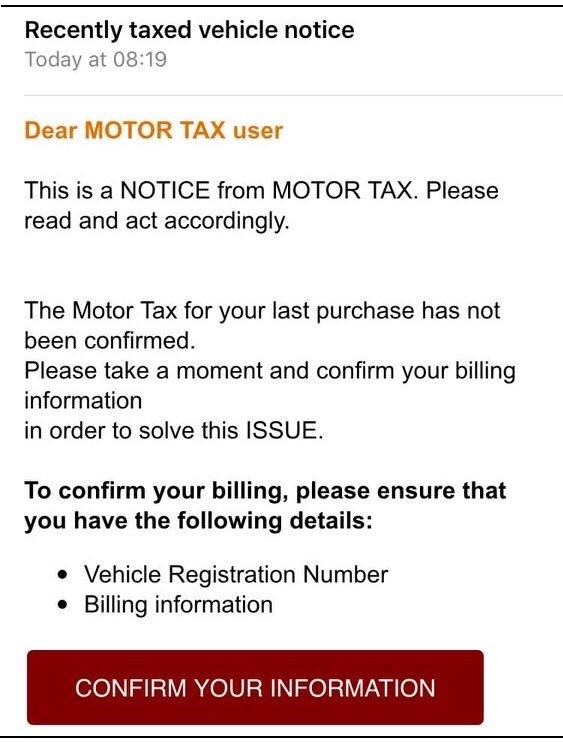The Department of Transport (Ireland) has warned motorists of a motor tax ‘phishing’ scam which is spreading fast. The emails request billing and vehicle details from vehicle owners in connection with their last motor tax transaction.
The Department said:
“These emails are a hoax. The Department does not send emails requiring customers to send this type of personal information via email or pop-up windows.”
Did you get a real or scam email?
Any motor tax notifications will come from this email address: info@motortax.ie.
Here is an example of the scam email :

Email Spoofing
These scam emails do not come from this email address, they use spoofed email addresses. E-mail spoofing has been a tactic used by scammers for a long time. A spoofed e-mail is one where the sender email address has been forged.
When a recipient receives the email they believe (falsely) it has come from a known source. They are therefore more likely to open it, click on a link in the message, provide the information requested or open an attachment. The spoofing technique is widely used by cyber-criminals to achieve various objectives including phishing, installation of malware and accessing confidential data.
If you recently received an email like this, and provided personal information in response, the department says you should contact your bank or credit card company immediately. The Department has contacted all the relevant authorities and local motor tax offices in relation to this issue.
Some advice to protect against scams like this:
If you're not sure whether an email is a scam, verify who the sender is by using their official contact details to call them directly. Never use contact details provided by the sender – find them through an independent source.
- Check the email address details and contact directly as outline above.
- If you receive an email out of the blue from someone claiming that you are entitled to a refund –press 'delete'.
- Watch out for tell-tale signs. While the sender may claim to be from an official source, their email may contain spelling mistakes or use poor grammar.
- Never click on links or open attachments in an email from an unverified sender – they may contain a malicious virus.
- Keep your computer secure – always update your firewall, anti-spam, anti-virus and anti-spyware software, and only buy from a verified source.
Any comments or questions on this or other articles, contact us at info@titanhq.com. For more information on the comprehensive range of business network security solutions offered by TitanHQ please visit www.titanhq.com
Talk to our Team today



